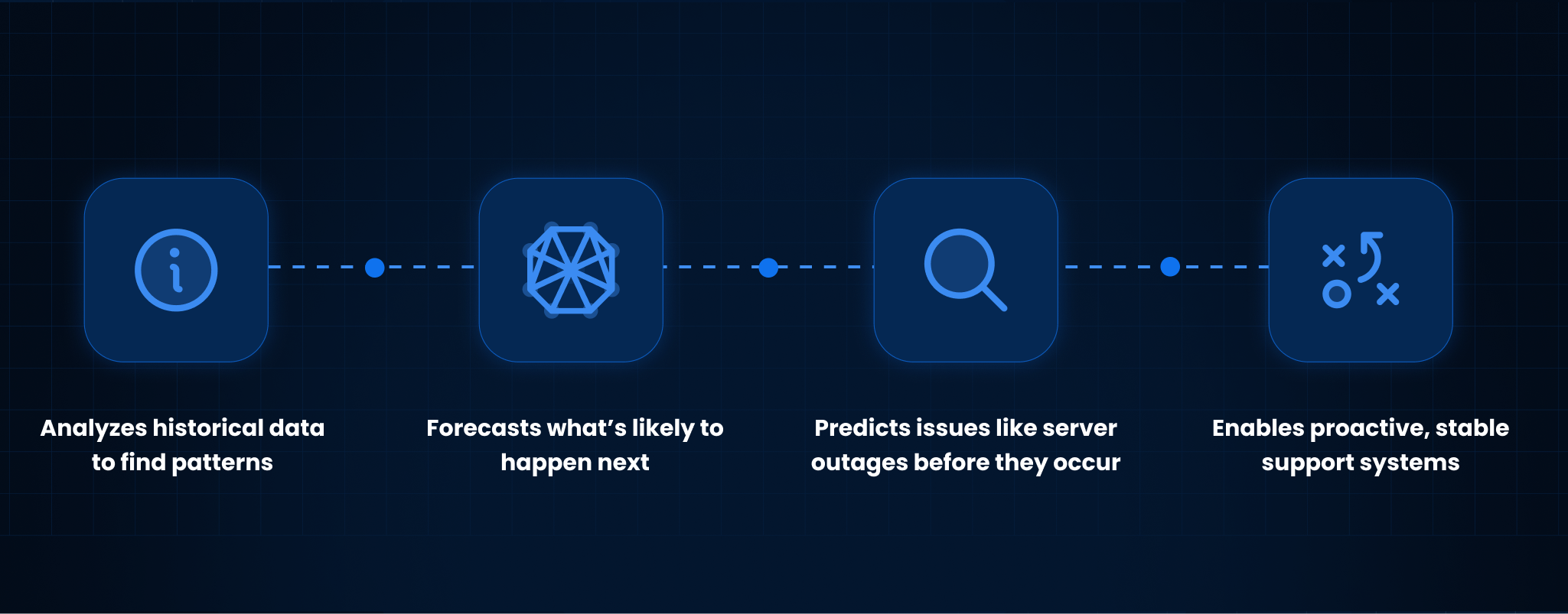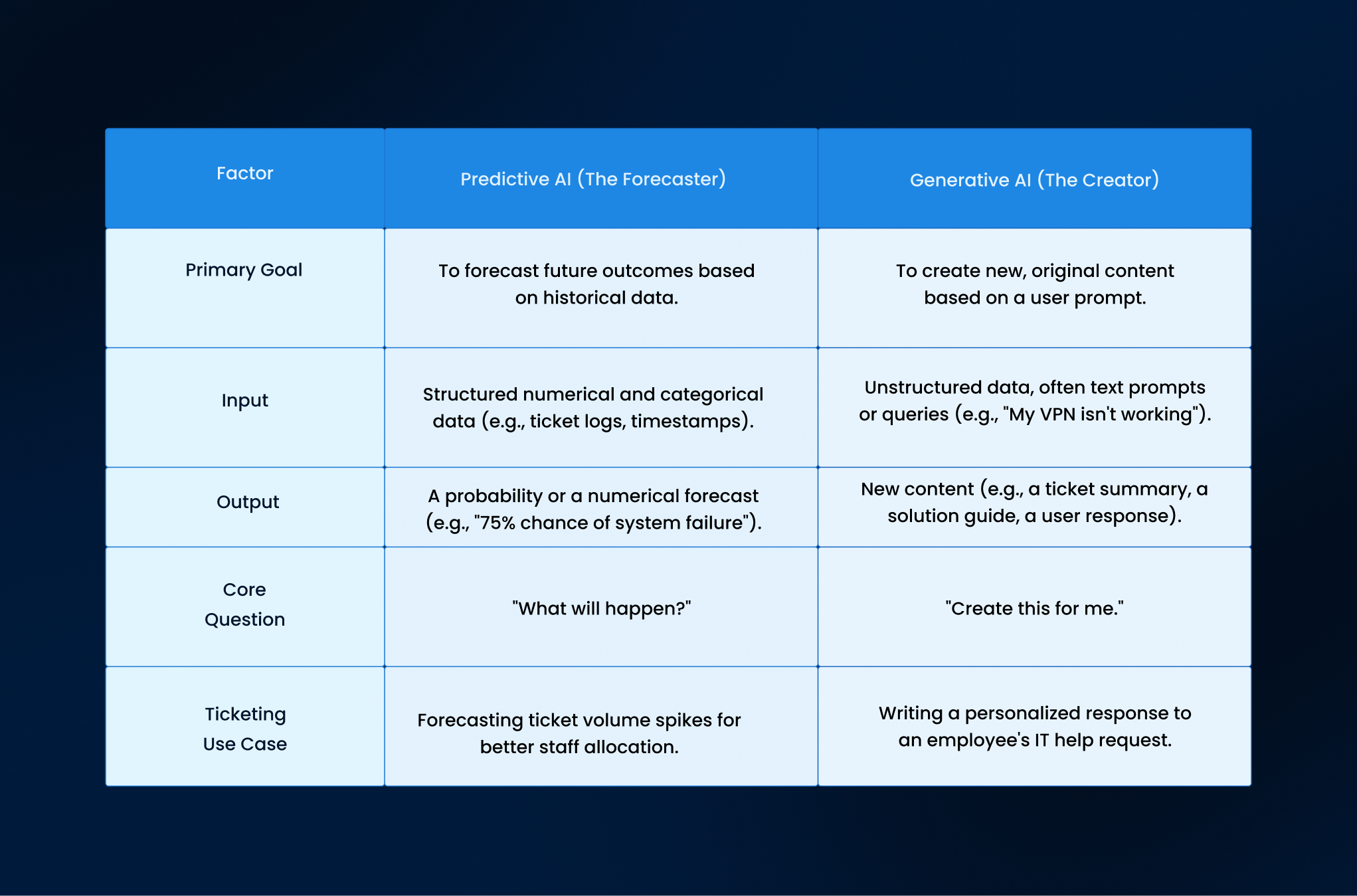Introduction
As a technology leader, you’re constantly navigating the next wave of innovation. Right now, the conversation is dominated by artificial intelligence, specifically the Generative AI vs Predictive AI discussion. You’re likely wondering which is better for your enterprise, especially for streamlining the complex web of your IT, HR, and Finance ticketing systems. The good news is that you don’t have to choose. The most powerful approach isn’t about picking a winner; it’s about understanding how they work together to create a smarter, more efficient enterprise.
This guide will break down the Generative AI vs Predictive AI comparison in simple terms. We’ll explore what each does, how they differ, and most importantly, how their synergy is the key to unlocking unprecedented productivity and a better employee experience by 2025. Let’s dive into how this dynamic duo can transform your service management strategy from reactive to revolutionary.
Understanding Predictive AI: The Strategic Forecaster
What is Predictive AI?
Think of Predictive AI as your company’s seasoned strategist or a hyper-aware weather forecaster. It sifts through mountains of your historical data, like past support tickets and system performance logs, to identify patterns. Its primary job is to answer the question, “What is likely to happen next?” It doesn’t create anything new; instead, it provides data-driven forecasts and probabilities about future events. For instance, it can analyze years of ticket data to predict when your next server outage might occur.
In your world of enterprise ticketing, Predictive AI is the key to becoming proactive. It moves you from constantly fighting fires to preventing them in the first place. By anticipating issues, you can allocate resources more effectively, manage workloads, and maintain system stability before a minor glitch becomes a company-wide crisis. This is the first step in building a truly intelligent support system.

Understanding Generative AI: The Expert Creator
What is Generative AI?
If Predictive AI is the forecaster, Generative AI is the expert creator. It’s the brilliant engineer on your team who can not only diagnose a problem but also write a clear, step-by-step guide to fix it. Generative AI uses its training on vast datasets to create entirely new, original content. This content can be text, code, images, or summaries. It answers the prompt, “Create something based on this request.”
For your ticketing systems, this is a game-changer for efficiency and knowledge sharing. An employee with a laptop issue can interact with a Generative AI agent that provides a personalized solution on the spot. If the issue is complex, the AI can create a perfectly summarized ticket for a human agent, complete with diagnostic steps already taken. Furthermore, it can automatically draft and update knowledge base articles from resolved tickets, ensuring your institutional knowledge grows with every interaction.
The Core Differences in the Generative AI vs Predictive AI Debate
While both are forms of artificial intelligence, their functions are fundamentally different. The debate over Generative AI vs Predictive AI often comes down to their distinct goals and outputs. Understanding these differences is crucial for deploying them effectively within your organization. Here’s a simple breakdown:

Viewing Generative AI vs Predictive AI through this lens shows they are not competitors. Instead, they are two sides of the same coin, each solving a different piece of the service management puzzle.
Beyond “Generative AI vs Predictive AI”: The Power of Synergy in 2025
The most forward-thinking organizations are already moving beyond the Generative AI vs Predictive AI standoff. They recognize that the real magic happens when these technologies work in concert. A modern, intelligent ticketing system uses both to create a seamless, end-to-end resolution experience.
Predictive Inception and Triage
The lifecycle of a support issue should begin before an employee even files a ticket. Predictive AI works silently in the background, analyzing system health and user behavior. It can flag a server that is performing poorly or identify a group of users struggling with a new software update. Consequently, it can automatically generate a high-priority incident ticket before anyone even reports a problem, allowing your team to get ahead of the issue.
Generative First Response and Data Collection
When an employee does need help, their first point of contact is a Generative AI-powered agent. This agent understands the user’s natural language request, asks clarifying questions, and provides instant, personalized troubleshooting steps. If the problem persists, the AI has already gathered all the necessary diagnostic information. It then generates a perfectly structured ticket, eliminating the frustrating back-and-forth that consumes so much time.
Intelligent Resolution and Knowledge Creation
Once the ticket is created, Predictive AI instantly analyzes it and routes it to the agent or team with the highest probability of resolving it quickly. As the human agent works on the ticket, Generative AI acts as their co-pilot. It can summarize long ticket histories, suggest potential solutions, and even draft response emails. After the ticket is closed, Generative AI autonomously transforms the resolution into a new, easy-to-understand knowledge base article, strengthening your self-service portal for the future.
Leena AI’s Approach to the Generative AI vs Predictive AI Challenge
At Leena AI, we believe the Generative AI vs Predictive AI conversation is not about choosing a side but about creating a unified intelligence. Our Agentic AI platform is built on this principle of synergy. We don’t just offer separate tools; we provide a single, autonomous agent that masters the entire ticketing lifecycle for your enterprise.
Our platform leverages Predictive AI to anticipate employee needs and proactively manage your IT environment. For example, it can forecast payroll-related ticket surges at the end of the month, allowing your teams to prepare. Simultaneously, it uses advanced Generative AI to deliver autonomous resolutions for up to 70% of IT, HR, and Finance queries. This means your employees get instant answers, and your support teams are freed up to focus on high-impact strategic projects. Leena AI orchestrates complex workflows across multiple enterprise systems, turning your service desk into a powerhouse of efficiency and a driver of exceptional employee experiences.
Navigating the Future: Your Generative AI vs Predictive AI Roadmap
As you plan your strategy for 2025 and beyond, moving past the Generative AI vs Predictive AI binary is essential. Your focus should be on building a cohesive ecosystem where both technologies thrive. Start by identifying the biggest points of friction in your current ticketing process. Is it ticket volume? Resolution time? Employee satisfaction?
From there, map out how this powerful AI duo can address those specific challenges. Begin with a clear data strategy, as high-quality data is the fuel for both Predictive and Generative AI. Finally, partner with a platform that understands how to weave these capabilities together into a single, powerful solution. The goal is not just to close tickets faster but to create an organization that is more responsive, resilient, and ready for the future.
Frequently Asked Questions about Generative AI vs Predictive AI
1. What is the fundamental difference in the Generative AI vs Predictive AI comparison?
The core difference lies in their purpose. Predictive AI analyzes past data to forecast future events, like predicting a system outage. Generative AI uses prompts to create new, original content, such as writing a step-by-step solution for an IT issue.
2. Do I need to choose one in the Generative AI vs Predictive AI debate for my company?
No, it’s not an either/or choice. The most effective strategy involves using both. Predictive AI helps you anticipate problems, while Generative AI helps you resolve them efficiently. Their combined power creates a comprehensive, end-to-end solution for service management.
3. Which is more important for reducing ticket resolution times?
Both play a role. Predictive AI can route a ticket to the right person faster. However, Generative AI often has a more direct impact by providing instant answers through a self-service agent or by helping human agents find solutions more quickly, thus significantly cutting down resolution time.
4. How does data security factor into the Generative AI vs Predictive AI discussion?
Data security is critical for both. For Predictive AI, you must ensure that the historical data used for training is anonymized and secure. For Generative AI, you need guardrails to prevent it from accessing or revealing sensitive information in its responses, often by grounding it in your company’s secure knowledge base.
5. What is the first step my organization should take when considering a Generative AI vs Predictive AI strategy?
Your first step should be a data audit. Assess the quality, accessibility, and security of your ticketing and systems data. High-quality, well-structured data is the foundation for successfully implementing both types of AI to solve complex business challenges.













